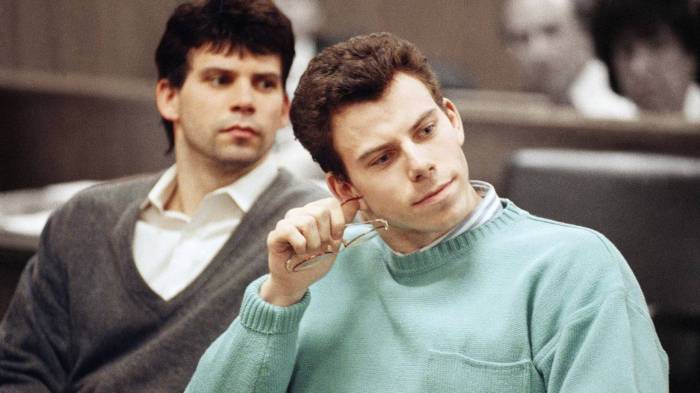Netflix’s Menendez show faces backlash for implying the brothers were lovers – Netflix’s “Menendez: Blood Brothers” has ignited controversy, facing backlash for implying a romantic connection between Lyle and Erik Menendez, the brothers infamous for killing their parents. The docuseries delves into the complex case, exploring the brothers’ relationship and the events leading up to the murders.
While the series aims to offer a nuanced perspective, its portrayal of the brothers’ bond has sparked heated debate, with critics arguing that the suggestion of a romantic relationship is unfounded and potentially harmful.
The series explores the brothers’ childhood, their strained relationship with their parents, and the events leading up to the murders. It delves into their psychological state and the motivations behind their actions, offering a glimpse into the complex dynamics within the family.
However, it’s the series’ focus on the brothers’ relationship that has drawn the most attention, with some viewers interpreting the portrayal as suggesting a romantic or sexual connection. This interpretation has sparked criticism, with many arguing that the series is exploiting the tragedy for sensationalism and potentially distorting the public’s understanding of the case.
The Menendez Brothers Case

The Menendez brothers case, involving the murders of their parents, Jose and Kitty Menendez, in 1989, captivated the nation and remains a prominent example of a high-profile crime that sparked intense public scrutiny and debate.
The Murders and Subsequent Investigation
The murders of Jose and Kitty Menendez took place on August 20, 1989, at their Beverly Hills mansion. The brothers, Lyle and Erik Menendez, initially claimed they were victims of a home invasion, but their story quickly unraveled under police investigation.
Inconsistencies in their accounts and the lack of evidence supporting their claims led investigators to suspect their involvement in the crime.
The Trial and Verdict
The Menendez brothers were arrested and charged with the murders of their parents. Their trial, which began in 1993, became a media sensation. The defense team argued that the brothers had been victims of years of physical and emotional abuse at the hands of their father, and that they had acted in self-defense.
The prosecution countered by presenting evidence of the brothers’ lavish spending habits and their alleged motive to inherit their parents’ fortune. After a lengthy and highly publicized trial, both brothers were found guilty of first-degree murder and sentenced to life in prison without the possibility of parole.
Public Fascination and Cultural Impact
The Menendez brothers case generated significant public interest, with widespread media coverage and intense public debate. The case resonated with the public on several levels:
- The brutal nature of the crime and the alleged motive of inheritance fueled public fascination.
- The brothers’ claims of abuse, coupled with the high-profile nature of the case, brought attention to the issue of domestic violence.
- The media’s intense coverage and the public’s insatiable appetite for details contributed to the case’s lasting impact on popular culture.
The Menendez brothers case continues to be a subject of fascination and debate, with numerous documentaries, books, and articles dedicated to exploring the events surrounding the murders and the subsequent legal proceedings. The case serves as a stark reminder of the complexities of human behavior and the enduring power of crime stories to captivate the public imagination.
Historical Context and Societal Attitudes
The Menendez case unfolded during a period of significant social change in the United States, where societal attitudes towards homosexuality and incest were evolving, albeit slowly. This historical context played a crucial role in shaping public perception of the case and the brothers’ relationship.
Societal Attitudes Towards Homosexuality and Incest in the 1980s and 1990s
The 1980s and 1990s witnessed a gradual shift in societal attitudes towards homosexuality, driven by the growing visibility of LGBTQ+ individuals and organizations. The AIDS epidemic, while devastating, also brought increased awareness and empathy for the LGBTQ+ community. However, homosexuality was still largely stigmatized and often met with prejudice and discrimination.Incest, on the other hand, remained a deeply taboo subject during this era.
It was widely viewed as a horrific crime, and any mention of it was met with shock and disgust. There was a strong societal pressure to silence victims and protect the family unit, even at the expense of justice.
Cultural Landscape Then and Now, Netflix’s Menendez show faces backlash for implying the brothers were lovers
The cultural landscape surrounding these issues has undergone a significant transformation since the 1990s. Today, there is greater acceptance and understanding of homosexuality, with LGBTQ+ rights becoming increasingly recognized and protected. The rise of social media and online platforms has also played a role in promoting visibility and inclusivity.While incest remains a deeply disturbing crime, there is a growing awareness of its prevalence and the importance of supporting victims.
The #MeToo movement, for instance, has brought attention to the widespread nature of sexual abuse and the need for accountability.
Understand how the union of Protecting a historic NOLA church from future storms can improve efficiency and productivity.
Influence on the Series’ Portrayal of the Brothers’ Relationship
The series’ portrayal of the brothers’ relationship, including the suggestion of a romantic connection, is likely to be met with mixed reactions. Some viewers may find it a refreshing departure from the traditional narrative, while others may find it offensive and disrespectful to the victims.The historical context and societal attitudes of the time are crucial to understanding the complexity of the case and the brothers’ relationship.
The series’ creators must be mindful of the potential impact of their portrayal and ensure that it is sensitive and respectful to all involved.
Wrap-Up
The controversy surrounding “Menendez: Blood Brothers” raises important questions about the role of media in shaping public opinion and the ethical considerations involved in portraying sensitive events. While the series offers a glimpse into the complexities of the Menendez case, its portrayal of the brothers’ relationship has sparked a heated debate, highlighting the power of media narratives and the importance of critically examining the information presented.
The case itself remains a source of fascination, and the series’ attempt to explore the brothers’ relationship, albeit controversial, has sparked a renewed conversation about the case and its lasting impact on society.
FAQ Overview: Netflix’s Menendez Show Faces Backlash For Implying The Brothers Were Lovers
What is the Menendez Brothers case about?
Lyle and Erik Menendez were convicted of killing their parents, Jose and Kitty Menendez, in 1989. The case gained notoriety for its shocking nature, the brothers’ claims of abuse, and the subsequent trials that captivated the nation.
What is the main argument against Netflix’s portrayal of the brothers’ relationship?
Critics argue that the series’ suggestion of a romantic connection between the brothers is unfounded and sensationalizes the case, potentially distorting the public’s understanding of the events and the brothers’ motivations.
What are the ethical implications of portraying a potential romantic relationship between the brothers?
The portrayal raises ethical concerns about exploiting a sensitive case for entertainment purposes, potentially causing harm to the individuals involved and their families. It also raises questions about the responsibility of media in portraying complex and sensitive events.
 CentralPoint Latest News
CentralPoint Latest News




